Let’s start this by just ripping the band aid off: Sonny Boy is a disappointment. Both created and directed by the acclaimed Shingo Natsume of Space Dandy fame and animated by Studio Madhouse, Sonny Boy was well equipped to become the darling of the Summer Season. And early on its run, it appeared to be just that! Intriguing plots and characters were introduced, the world began to expand, it was engaging! But then it kept expanding. Questions kept being asked and no answers were given. Time and space became figments of our imagination and Sonny Boy itself seemed to forget that it was supposed to be telling a story. The whole thing quickly transformed from “Abstract exploration of growing up” to “Meandering arthouse with no idea what it wants to say”. At least, that’s my take on it. The purpose of this review is to explain how I got there.
So lets jump in.
Be warned, this review contains minor unmarked spoilers for Sonny Boy. It also contains major spoilers in some sections however these will be heavily marked to avoid accidents.
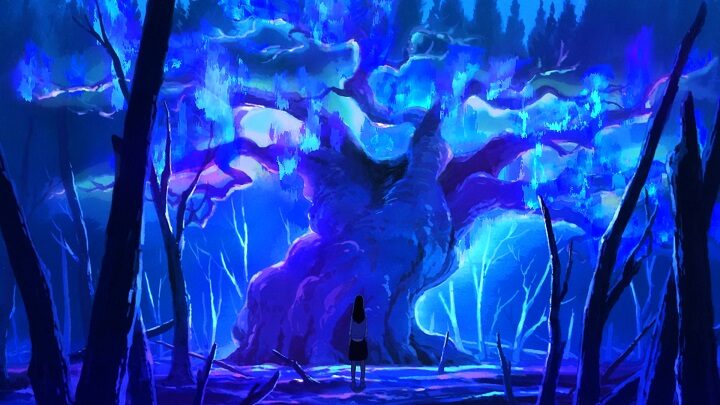
Visuals
First up lets talk about something positive, something that is arguably the best part of Sonny Boy: The visuals. I have a lot to say about the narrative, characters and structure of the show. But one thing I, nor anyone else, can dispute is that Sonny Boy looks gorgeous. I would go so far to say that, visually, it’s the best looking show of the Summer 2021 season. The character designs by Hisashi Eguchi and Norifumi Kigai are simple with low line counts and forgo any complex shading. But this allows Satoshi Hashimoto to spend less time worrying about the individual characters and more focusing on the overall scene and how the colors all work together. Additionally these designs allow the animators more freedom with their work. They aren’t tied down to complex models or lines, instead prioritizing movement and personality without sacrificing much in the way of accuracy.
Of course with Sonny Boy’s almost arthouse nature I doubt accuracy was all that big a concern. Sonny Boy routinely plays with, or outright disregards, things like perspective and space. I’m talking about two characters having a conversation only to rotate the camera and reveal what we thought was the wall or ceiling is actually the floor. Or overlapping objects and then using that overlap to either merge, split or duplicate them. Even zooming out to show that a scene was thought was happening in one place is actually taking place in another. These all make for an incredibly interesting and engaging visual ride. And it doesn’t stop there! Sonny Boy does so much, tries so many things, that it would be disingenuous to pretend I could explain it properly in a few paragraphs.
Suffice to say if there is any reason at all to watch Sonny Boy it would be the visuals. It isn’t perfect, often this kind of creativity butts heads with the narrative and we see that here as well. Many of the more creative or interesting shots, while beautiful, make it difficult to parse what is actually happening on screen. And if you ask me striking that balance between innovative and serviceable, of being creative and properly communicating with the viewer, is just as important as the visuals themselves. And this is something that Sonny Boy routinely fails at. Though how much of this is the fault of the visuals and how much the nonsensical story is something we still need to discuss.

Narrative
Oh the narrative. This is where I’m going to get the most hate. This is normally where I would give a synopsis of the show, maybe talk about the setup, the payoffs and where it goes. But that’s kind of the issue with Sonny Boy. It doesn’t go anywhere, it doesn’t payoff anything. To put it simply: Sonny Boy’s story and characters are absolutely atrocious. I mean legitimately terrible, like the writers had no idea what they wanted to do. It might as well not even exist for how relevant it is to what is happening on screen! It’s like Shingo Natsume had a lot he wanted to say, so much that he couldn’t fit it into a single anime, and then he went and did it anyway. Like he had no one there to tell him “No, stop, this is to much pull back”.
At it’s core Sonny Boy is a coming of age story for Nagara and his class. It’s about growing up in an uncertain world and finding your place in it. Exploring different communities, meeting new people both good and bad, and literally exploring the “universe” AKA the world around you. It does this in two halves: The first half is a more linear and straightforward story of the whole class while the second is effectively a series of vignettes, smaller stories that are independent of each other but meant to connect back to a larger narrative. As far as ideas go, this is great! I love coming of age stories and anthology series can be good fun! But where Sonny Boy falls short, and by short I mean face plants into the dirt, is in linking these stories into something greater. Hint: It doesn’t.
After the halfway point Sonny Boy begins to go wild. Every episode introduces a new idea, new information, new characters, new plot threads. It tries to explore ideas like war, governing, loss, the unfullfiling existence of a Salaryman in a corporate hellscape designed to trap everyone in slave labor. You know… regular stuff. And some of these are pretty good! I actually really enjoyed the Salaryman story, it was my favorite episode of the show, and the others had good ideas of their own. But the issue is that once an episode is over, Sonny Boy no longer cares about it or its message. The threads become abandoned, the characters forgotten, the “story” moving ever forward to the “next idea”. And that’s Sonny Boy’s biggest problem for me. It never finishes or fleshes out anything. It’s content to throw them on the screen and say “Think about it”.
Some may say that this is intentional, that this is the point. That Sonny Boy is only introducing ideas for the viewer to think about and come to their own conclusions. But nothing Sonny Boy tries to talk about goes beyond Philosophy 101. They can’t! Because Sonny Boy doesn’t spend enough time on any of them to really flesh them out beyond that point. As an example: Midway through the show half the class leaves for what is, effectively, the military. They go through boot camp, get medals and ranks and eventually end their service. This is a good idea! However we only get glimpses of this throughout the show. We never explore what their time was like, we never get to experience the writers opinion on the subject or get asked uncomfortable questions about the military industrial complex. We are simply shown… that it exists. And that’s boring.
Of course the problems don’t stop there. Sonny Boy asks more questions than it ever answers. Who or what is the Principle? Mrs. Aki? What happened to Hoshi, Cap, etc? Some may say that we aren’t supposed to know. That the answers to these questions aren’t the point. To that I say “Maybe to you”. But for me, and many others, Sonny Boy’s refusal to even attempt to tell a proper story is frustrating and makes for an ultimately unpleasant experience. Chekhov’s Gun, foreshadowing, red herring, etc. These things exist for a reason. And claiming “Avant Garde” is not a defense for failing to use even the most rudimentary of story telling techniques. I just wish that someone was there to tell Natsume “Slow down”. Because as it is Sonny Boy is an inconsiderate mess for anyone but the most dedicate of fans to figure out.
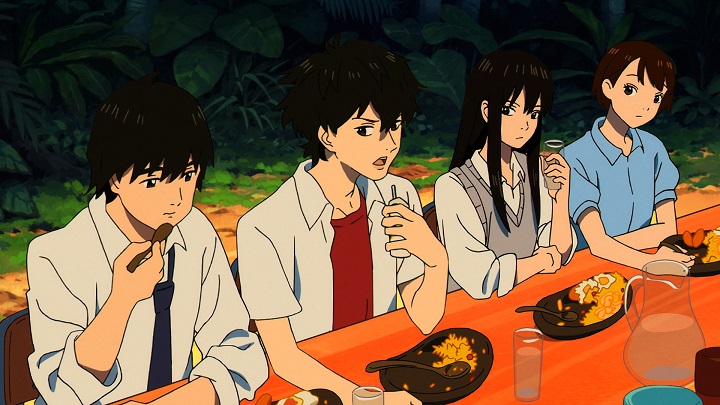
Characters
This brings me to the characters who have been left adrift at sea with no story to actually work through. Where does that leave them? In a bad place I’m afraid. Sonny Boy does very little with its characters. Or should I say it does very little that is satisfying with them. Asakaze, Hoshi, Nagara, Nozomi, each of them have their stories. They have one-off episodes that focus on them of course. But like the rest of the story these are generally abandoned as the narrative continues its unending march towards new ideas. Rather than finishing any of these characters in a satisfactory way Sonny Boy is instead constantly introducing new ones every week. Giving us mediocre episodic character bits that are supposed to in some way reflect on our leads but rarely actually does so. The one exception to this for me would be Mizuho.
Mizuho is the only character who I think gets an actual arc. The rest are either like Nagara, in that their “arc” largely happens offscreen or in abstract terms, or like Raj, who doesn’t have an arc at all. She starts the story a selfish, spoilt brat who must be taken care of by others. But as Sonny Boy progresses we see that change. Her relationship with her cats shifts, she begins to be the one taking care of them, etc etc. Compare that to Nagara who starts and ends the story as a wet blanket who puts the breaks on any scene he is in. Like… there’s no kind way to put this: I didn’t care about or become invested in a single member of Sonny Boy’s cast. And that’s damning to a show like this.
There’s so much more I could say about Sonny Boy’s cast. That most of them are a detriment to the story, never giving only taking. That the show itself doesn’t seem to care about them. How Raj apparently had a far more interesting journey on the side that I would much rather have watched but we never got to. But to go on for paragraphs pointing out every issue with ever half-baked character in this show would just make this a rant so I’m going to cut it off with this: A character drama that cannot get it’s viewers invested in its characters has failed at the most basic level. And that’s what Sonny Boy has done. None of the big reveals or twists, none of the backstories, not a single thing moved an emotion in me beyond “Why am I watching this”. And that’s not ok.
Audio
Finally this brings me back to something positive, the audio and OST portion of our chat. The music at least, worked on by more people and groups than I can list, is good. The freedom allowed to Sonny Boy may have cursed its narrative but it has allowed something great here. There is just so much… variety in Sonny Boy’s music that I can’t help but be impressed. From the adventurous and active “Summer Storm” to the haunting yet elegant “Judgement“. The smooth drums and flute of “Soft Oversight” to what is almost psychedelia in “Let There Be Light Again“. There are even songs that change genre’s mid-track like “Tune from Diamond” or the 10 minute epic that is “Yamabiko’s Theme“. Seriously just give it a listen. For all that I have, and will continue to, slam the narrative I can’t help but recognize this OST as a good one.
Meanwhile the VA and sound design in Sonny Boy is nothing to scoff at either. Of course I’m no sound engineer so I can’t appreciate the finer points of the work. But what I can say is that throughout the series I was never taken out of the moment by how it sounded. Part of this is no doubt due to the abstract and unique nature of Sonny Boy as a show. There aren’t many sounds that would be out of place in such a wild premise. However the fact remains, whether it be the soft-spoken nature of many of the characters, the roaring of a fire or the otherworldly stillness of war Sonny Boy always managed to find just the right sound to fill the space. And for all that I’ve ripped into it above I can at least give credit where it’s due.
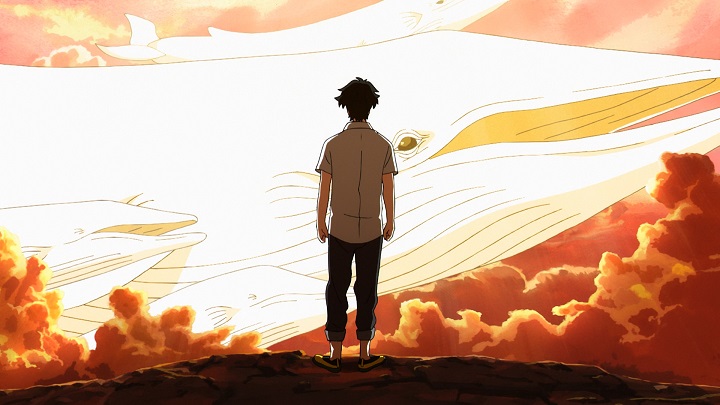
But its “Art”
And with that we are done with the review proper leaving only this final, personal, section to go. This has absolutely nothing to do with the score or any one section of the show. This is entirely me ranting about my experience with Sonny Boy without regard for spoilers, propriety or anything else. It has absolutely no bearing on the final score. If that’s all you care about, feel free to skip! But if you want into my head space for a bit read on! (Click to reveal).
So yeah… What the hell is this show? I’ve seen many people call it “art”, “avant garde” or “abstract”. Arguing everything from “You can’t judge art” to “You’re not supposed to get it” and “You’re just not smart enough”. And yet no matter the analysis I read or watch, no matter how many discussions I sit through, none of them change one thing: I didn’t enjoy Sonny Boy. It failed at the most basic of tasks for a series. It failed to properly communicate with the viewer. I don’t care what ideas you have, you could write the greatest philosophical treatise known to man, solve all of our problems in 100 pages or less. But if you write the whole thing in Wingdings and no one can read or understand it… did you actually write anything of value? I would say no, you did not.
Thats the crux of the issue for me with Sonny Boy. That the you convey an idea is just as important as the idea itself. And Sonny Boy gave 0 consideration to that. It was content to spout philosophy at its viewer without rime or reason, without a care in the world for if people watching caught it. Like the scribblings of a madman, it wrote on the walls like it was the only one that mattered. And you know what? If Shingo Natsume enjoyed it, if he is happy with his work, then good on him. If he is satisfied with what he has created then nothing I say can or should change that. But don’t expect me or anyone else to care.
I’m not saying that series have to spell things out. Leaving nothing up to the viewer at all can be just as bad although for different reasons. But there’s a sweet spot there between “Dry and dull” and “Ravings of a lunatic”. There is a balance you must strike. One where you introduce the audience to the ideas. Where you convey your own feelings without demanding the audience think the same way you do. And in doing so you prompt them to think about their own answers to those ideas. If half of your audience can’t even understand the idea your trying to convey… what are you doing? Do you want this to be some esoteric work where everyone has their own understanding of what it means, fighting over the one truth? Or do you want to actually connect with them in any kind of meaningful way?
Of course there is another half to this argument: That your story must be interesting and engaging. The sad truth is that if you want people to stick with and watch with their full attention all the way through, the story you are telling has to stand up on its own merits. Independent of whatever philosophy you are trying to peddle. If your story fails at that most basic of tasks, then no one is going to watch it. If they wanted dry pseudo-philosophy they would have just read a textbook or scrolled through Wikipedia. And this is the other part where I think Sonny Boy failed. It never bothered to create a story to go along with the ideas it wanted to convey. Instead it just lazily slapped something on top and called it a day. And that’s not something I can forgive.
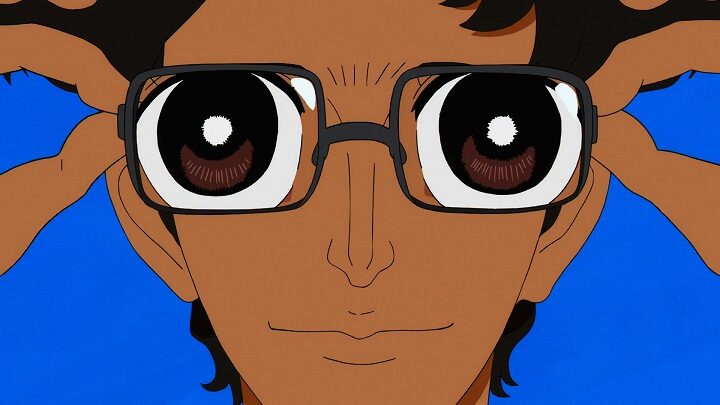
Conclusion
All in all I can’t help but view Sonny Boy as a disappointment. I had a lot of hope going into it, I thought that the premise was great and the visuals fascinating. But as Sonny Boy went on and on and on… I realized it was never going to do anything. That none of the threads would ever come back together. That it had no intention of telling an actual, complete story and was more interested in rambling away through a bunch of vignettes. If that’s your thing, go to town! There are a lot of reasons to enjoy Sonny Boy. But if you’re like me and you like something… substantive out of your anime? Steer clear. Because Sonny Boy will leave you unfulfilled and wishing you had spent your time watching something with a bit more meat on its bones.

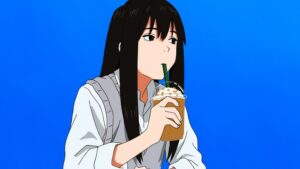
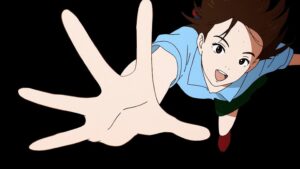
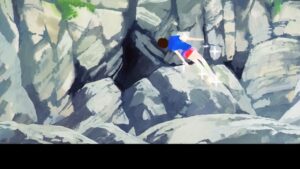
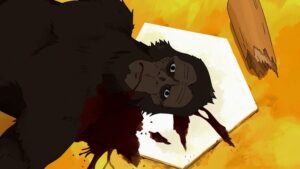
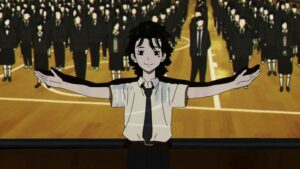
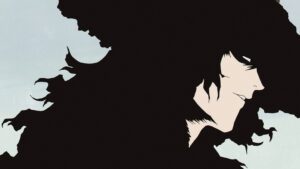
I wonder how unpopular your opinion really is. The reactions in the reddit thread after the finale were mostly positive (as far as I could tell), which would indeed seem to indicate that your views are not shared by most viewers, but on the other hand, most people who aren’t into artsy stuff like this probably already dropped it a long time ago (or are simply less inclined to discuss it), and if you include that larger group more people might agree.
In any case, personally I largely share your opinion. My score is slightly higher than yours (I gave it a 5 on MAL), but I am essentially of the same opinion: though Sonny Boy is full of interesting ideas, the execution of those ideas is generally terrible. The reason I rate the anime a little higher than you is probably just because I do think that, despite its many flaws and the profound lack of any emotional investment on my part in what’s going on, I still think it’s a pretty interesting show, and though I don’t think any of the episodes was truly excellent, I consider most of them to be at least “decent”: they often at least had some ideas to convey or stories to tell that were fairly interesting, and that was enough for me to at least not drop it (which is admittedly a rather low bar, but still). For example, I quite like the overall premise of the show (subverting typical isekai stereotypes by making the other world super weird and undesirable to live in, and by exploring how ordinary people would react to such a loss, instead of just the typical otaku who’s happy to be rid off reality), and some of its ideas were very interesting (like the clone stuff: what it would be like to live together with your clone, or if a clone took your place in the universe while you’re sent off elsewhere). Of course, those ideas were almost all terribly executed (we don’t really see any of the characters struggle with the clones taking their places, and the drama about being isekaied doesn’t really go beyond your typical Lord of the Flies stuff), so a little positivity only gets me so far. But still, I wouldn’t definitively say it isn’t worth watching (at least for some people): on the one hand, the story, characters and world building are all definitely subpar in my eyes; but on the other hand, it’s hard to deny Sonny Boy is one of the most original shows of the last few years, with lots of interesting ideas and a strong presentation. And for some people, that’s probably enough. If you want a good story or characters, better look elsewhere. But if you’re looking for an artsy show with a melancholic tone that explores a lot of interesting ideas (if rather halfheartedly) in a way that leaves a lot of room for interpretation, this might just be what you’re looking for.
All this time I was waiting for the episode where Sonny Boy would suddenly make sense, and then it ended.
Thats what I was waiting for to. An episode where everything would click… and it never came.
To be fair, it had something it wanted to say after a rewatch from the start. To quote Thomas Wolfe’s famous novel: You Can’t Go Home Again.
These kids all want to find their way home, back where they could continue to feel comfortable in their own bubble of time where they’d still be with each other and they could still feel “young”, but it just can’t happen due to circumstances beyond their control, especially from decisions and interactions that have long-term consequences. And once you do grow up, things have to change, you have to mature and owe up to the decisions you made in the past, and there will be places and people that you knew in the past that will have changed drastically, sometimes the people you once knew won’t even remember you. No matter how hard you want to feel young again, going back to that time where you thought those years were the best in your life and want to avoid that dreaded adulthood, you can never go home again.
And that’s what happens to Nagara, Mizuho and the others in this literal version of Wolfe’s quotation. They try so hard to return to that idealistic time of being in high school, especially halfway through when they find themselves in another reality where they are required to move on, but in the end, the same line from Wolfe applies to all of them: You can’t go home again.
That’s what Radjhani realized in his 2000 years of travelling, and what the rest of the students were forced to realize going their own separate ways, some of them stubbornly trying to stay in their idealistic worlds and fantasies and suffering because of that. That’s what Nagara and Mizuho themselves realized in the end when they chose to return “home” and accept that it’s not going to be what they had envisioned in the short-term while in high school. All they can do is move forward in their lives.
“You can’t go back home to your family, back home to your childhood … back home to a young man’s dreams of glory and of fame … back home to places in the country, back home to the old forms and systems of things which once seemed everlasting, but which are changing all the time – back home to the escapes of Time and Memory.” – George Webber
I honestly don’t know if Natsume explicitly thought of this, or Wolfe’s quotes when making the show, but it does feel quite honest of what he’s trying to say based on this, rather than just throwing in symbolism for the sake of it with no real meaning behind it all.
And yeah, that quote is from the main character George Webber from Wolfe’s novel. In fact, the book got some heat back then for being rambling without much coherence and yet it’s considered an American classic today.
Yo, I saw your Thomas Wolfe comment under the Toe video (サニーボーイ・ラプソディ) from the OST on Youtube. Glad you enjoyed the song and the show.
It’s like I’m looking at a picture and some people insist that it is just a wall. I guess it goes to whether rating should be subjective (ultimately meaningless as it is not framed in any context) or objective (ultimately meaningless as subjective point o reference does not allow to ever affirm what objective is).
I dont know, score of 38/100 seems like an absolute joke to me, but I guess there’s This World where that is a reality. I also guess in MAL score, this 38 means about 6.5. I don’t really get hang-up on scores, if they are consistent, but I seriously doubt the author would rate that many shows worse than this, despite the fact that most that comes out nowadays is pure unadulterated trash intended for throw-away consumption. I guess if trash feels good, that’s all that matters, though I’ll never acknowledge that perspective.
I will always believe even media needs to be held up to a standard and that for me is that it needs to fulfill a function, it needs to leave you a better person. I never had any illusion about general populace about the tastes, but to think that experienced bloggers even do not get this show, I dont know if it is too bad or too good, but I dot absolutely know it is not mediocre and that it makes me think, and that about closes the case for me.
Also: I dont believe this show ever tried to tell a story, never implied it and never needed it. Can we at least acknowledge this one thing?
PS: takign reddit comments as a representative sample is not a good idea. There is several obvious selection biases going on in there.
Here’s the thing: I value throw away entertainment where I can enjoy a few hours of my day more than I do an incoherent think-piece. If Sonny Boy was actually able to communicate in a meaningful way, was actually able to get its ideas across, then I would have scored/liked it a lot more.
But it didnt.
You say that media needs to be held up to a standard, that it needs to fulfill a function. So let me ask you this? What standard did Sonny Boy meet? What function did it serve? How did it make you a better person? Because for me it did none of those things. It was a mediocre waste of my time, though a pretty one.
As for “not getting it”, I detest this justification. This isn’t a defense of the show nor a critique of someones thoughts. Its simply a dismissal. Its “You need 200 IQ to understand this show” reasoning designed to make the one using it feel superior while putting down those who don’t like it. There’s no counter argument to it because its not an argument to begin with.
PS I would 100% rate shows below this. I’ve done it to quite a few actually and if you checked my Anilist you would see that. Simoun, Golden Time, Noblesse, Berserk 2016/17, SAO Alice, Slow Start, Promised Neverland Season 2, Symphogear, Saiki K, Gridman, Penguindrum, Hoshiai no Sora, Kado, The Reflection (Even has a review on this site), Bungo Stray Dogs, Jojo Season 3, Clannad, Clannad AS, One Punch Man S2 (Review on this site), Sarazanmai, Kokkoku (Review on this site), 2.43 (Review on this site), Laid-Back Camp. And those are just the ones I finished rather than dropping outright!
You want to take shots, take shots. But next time I recommend you check some facts before you do so mate.
Finally got caught up. Sorry it’s not your cup of tea, but thank you for covering the show.
I really enjoyed this. Ep 12 in particular is a masterpiece. I don’t think I understand it, but I do think there’s something here to understand, even if I never fully do. Looking around MAL, Reddit, and other blogs, I’ve read many great observations. I’ll take a stab at it myself, and while I can’t cite them you should know the observations I’m presenting/working from are out there to be discovered.
Before I do, a note on storytelling: Dark Souls tells much or most of its story through item descriptions. A player can go ignore the descriptions entirely and still enjoy a great action game, but her or she won’t understand why characters appear, disappear, or move from place to place for seemingly no reason. Such a player might even feel Dark Souls doesn’t really have a coherent story, but they would be wrong. Similarly, giving story notes through seemingly out of place sequences or frames is an established technique in cinematography, and Natsume is using it here. For example, in Ep 9 Rajdhani relates how the cats delivered two copies of his only-one-copy-ever-made tick dating sim, but Natsume shows us a shot of two game cartridges, featuring identical tick artwork, sitting on Rajdhani’s desk back in Ep 5. The question is whether any of the odd sequences and frames Sonny Boy shows us are geniunely red herrings and random, or if they all correspond to the story.
Okay then. It’s been some time since I looked at quantum mechanics, and I probably wasn’t paying enough attention, but the consensus seems to be that the Many Worlds interpretation is at play here. Since there’s a lot of sense to that, let’s run with it. In Ep 12 we learn that Mizuho and Nagara return home via the point at which all dimensions intersect (I don’t know how that squares with quantum mechanics, so we’ll chalk it up to artistic license). When they pass through this point, they neither enter a world from which they’ve been missing, nor displace their “original” selves somehow, nor does Nagara summon a new world identical to their old one; they are not copies of originals, because they are not returning to a baseline reality, just a familiar one. In the Many Worlds interpretation, there’s no one true universe of which the others are merely copies; rather, parallel universes are variations on one another, to lesser or greater extents. Seeing the intersectional point, then, was Nozomi’s power, and when Nagara made the first jump at the end of Ep 1 he shifted them to a universe closer to the point. Maybe the blackness they first found themselves drifting in was the most remote universe possible.
In this sense the Nagara and Mizuho who have lived unremarkable lives for two years are as much copies of the drifting Nagara and Mizuho as the reverse, and what happens when the drifting pair returns is a syncing and merging with of the two sets of copies into one stream.
If the Many Worlds interpretation is in force, this also suggests that when the schoolchildren are walking around helplessly in Ep 6’s movie, the correct action would have been for each child to have stepped into his or her image, thereby syncing back up with their other selves. Koumori is telling the truth when he says they almost made it. It also explains why there’s a time limit to go back: the individual can’t sync because the selves have diverged too much. Rajdhani declines to return because he can’t, even if he wanted to; far too much time has passed for him to sync. Neither can anyone else, especially Asakaze when he meets Nagara and Mizuho near the intersectional point.
Mizuho and Nagara are able to pass through because they never stopped working to get back, never diverted into other pursuits which would have diverged them from their other selves. (Except for the bit about becoming rocket scientists. Like I said, artistic license.)
This hypothesis is probably wrong, and even if it isn’t it raises more questions than it answers. But talking about it is part of the fun, right?
Hey sorry it took me so long to get back to this! I hadn’t found the time to read it in full.
First I want to say thank you, I appreciate the effort you took to write this out and even if we disagree on the show itself it’s always nice to get another point of view, you know?
As for the show I’ve read a lot of dif interpretations for it. Some were good, others not so much. And ultimately what its done is that I think the show was slightly more intentional than I gave it credit for here but at end of the day none of it changed one very important fact for me: This was not a show I enjoyed watching.
I don’t mean in the sense that “Every show has to be happy/funny/entertainment”. I’m watching Haibane Renmei right now and enjoying that despite the fact that no one would describe it as “cheery”. I mean it in the sense that, while watching the show, I never felt satisfied by it. I never felt like the show cared about the viewer or how it communicated its message to them. It felt more like someone splurging their thoughts onto a page for themselves.
And you know what? That’s totally ok! If he wanted to make this for himself, and himself alone, then more power to him. But I don’t think its right to expect everyone else to enjoy it the same way. Not when they fail to present the story in a way thats understandable for them.
So yeah that’s probably my biggest issue with Sonny Boy at this point. As a show I just don’t think it’s worth watching. I got more value out of the show reading everyone elses feelings on it than I did from watching the show itself.
For sure, Sonny Boy isn’t a show the viewer can casually plop down on a couch with a bucket of popcorn, hit play, and expect to understand what’s on the screen.
Most people have heard of quantum mechanics and parallel universes, and many are like me, at least somewhat familiar with how how they are theorized to work. But I know I’m not smart enough put things together (assuming there’s something here to put together), even knowing that parallel universes are involved, without going out and reading others’ thoughts. This is a show which seems to require the collective intelligence of the community to understand the story (unless the director gives a tell-all interview, which doesn’t appear to be forthcoming); but now the show’s ended, who’s going to keep the discussion alive? Maybe some savant will give us a NGE-level analysis.
Would NGE have become so popular in today’s environment, or would people have simply moved on to the next season’s worth of shows? I’m not saying everything has to be War and Peace, but the constant flow of 12-episode shows feels like constant snacking rather than sitting down to a full meal.
I feel Sonny Boy needed at least 14 episodes to stretch out. Ep 5 was the worst for me, as it had me lost for ten minutes before I began to figure out what was going on. I think the introduction of the pocket universes–not to mention the fake Aki-sensei–would have benefitted from being expanded into two episodes. Plus, I agree with the sentiment that the other classmates should have gotten more screentime, maybe in the 8-9-10 sequence, to further show the viewer the drifting apart. 14/15 episodes would’ve been perfect, 18 too much, and 20+ well into filler episode territory.
(I’m not trying to hold a conversation, just prattling on because I like the show.)
Switching discussion to the plot itself, one thing I haven’t seen brought up is the Nozomi in Ep 12 is much shorter than the drifting Nozomi, although the differences in facial structure has been noted. Two years of growth might be an explanation, but Mizuho is the same height in relation to Nagara as at the start. When Nagara is frowning at the alive-Nozomi, he’s trying to reconcile the differences.
I think it was someone on MAL who proposed that one of the compasses was exchanged for a universe in which Nozomi was alive, and that seems on the right track. It can’t be their original universe, because Nozomi is dead there. I wonder if Asakaze propelled Mizuho and Nagara into a universe where a version of him was happy.
Nozomi is an enigma in an enigmatic story, but maybe someone else will take that up. I will say that she seems to show the least character development of the main cast. Nagara’s development is tiny, but important. Rajdhani and Asakaze develop, but away from humanity. Mizuho shows the most positive development, starting out wounded and surly and becoming forward-looking, with at least one friend.
As a final note on Mizuho, the modern Japanese funerary practice is to cremate the body, after which the family sifts the ashes and places the remaining bone fragments into a box. Had a friend describe doing this. He said it gave him incredible closure. This is the scene at Mizuho’s grandmother’s funeral, where Mizuho, her mother, and presumably her aunts are standing around a counter.
“unless the director gives a tell-all interview, which doesn’t appear to be forthcoming”
I don’t know about the sort of definitive explanation you’re hoping for, but there is this (as of yet untranslated) interview that may hold some promise:
https://akiba-souken.com/article/53176/
“Maybe some savant will give us a NGE-level analysis.”
I think this is highly likely given Sonny Boy’s conceptual nature, as well as how much of Eva’s DNA Sonny Boy ended up possessing (episode 12’s mirroring of the fourth Rebuild film, for example). There are already posts like this floating around:
https://www.reddit.com/r/anime/comments/pglebe/sonny_boy_episode_8_discussion/hbehwez/
The only Q&A I want from the director is:
Q: Season 2?
A: I can’t really talk about it right now. Ask me again next year. (laughs)
Great comment on Reddit, really fantastic stuff. Lately I don’t even think about r/Anime. I think I got the gist of most of it (I knew I shoulda read Nietzsche instead of all those Superman comics). I wonder how War in Ep 8 correlates to War in Ep 10.
Can you elaborate on the mirroring?
Sure. Spoilers for Evangelion 3.0+1.0 below.
It’s mostly Nagara’s arc that reminds me of Shinji’s. Both are damaged young men, made emotionally detached by the absence of their parents. Both start in dark places (Nagara with no hope for his high school future; Shinji having been traumatized by Kaworu’s death), but soon find themselves surrounded by natural beauty (Sonny Boy’s island; Eva’s Village-3). Both start to recover from their isolation, even as they lose someone dear to them (Nozomi; Rei). Both take metaphysical journeys to the origin points of their universes (the dimensional wormhole; the Anti-Universe), which are enabled by their lost loved ones (Nozomi’s compass; Shinji’s infinite synch rate with Rei in Unit-01). Both travel to worlds that are similar but not identical to their own, where their stories end. Also, in both series, secondary characters (Yamabiko and Kodama; Rei and Kaworu) make appearances to demonstrate that the new world and the original world are connected.
In case anyone stumbles across this comment section in the future, there’s now a translated version of the above akiba-souken interview available here:
https://letsdiscoverthingsthataregood.wordpress.com/2022/06/30/sonny-boy-final-episodes-interview-with-shingo-natsume/
Incredibly, the interview confirms the relevance of M-theory to the plot of episode 8, as predicted by that Reddit comment I linked above.
I know I’m coming to this review incredibly late, but I don’t think you understood the show much. I cannot blame anyone for that, because it does feel very arthouse and disconnected. The show resonated with me and inspired a rewatch, which helped me understand what was happening, how it all tied together and why the chaotic narrative structure is itself a plot device used to create the setting. I think specifically calling Mizuho’s arc one where she started as a “spoiled brat” really showcases a lack of understanding about the show. Again, I don’t blame you because that was exactly my take on my first watch. So I guess I’d just say I compel you or anyone else to rewatch it, especially with an understanding of a multiverse narrative like the novel Dark Matter presents which is a bit more straightforward.
The show is about a class who goes to a school where the principal is “God” (or at least someone who has the ability to place individuals in superposition in a nonlinear multiverse) and uses that ability to create versions of each class that are thrown adrift into the multiverse. In this class we have two individuals who have what seem to be what we would assume are the two pieces of God’s powers, creating identical versions and Observer. The actual narrative follows those two individuals deciding to stop drifting, but what I think messes with the viewing experience is that the narrative takes a backseat to the character arc each goes through in learning about the multiverse, their powers and themselves. While this story is really hard to grasp initially it is there and it is well told (on the second watch) once you realize the chaotic narrative structure is itself a part of the setting.
I don’t disagree that this show is trippy and hard to follow but I think the rating here is a massive disservice to it. It’s deep and hard to follow, but it’s honestly a masterpiece.